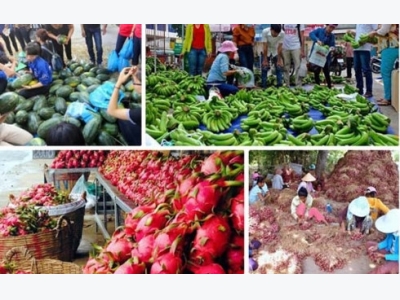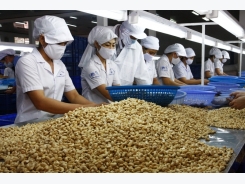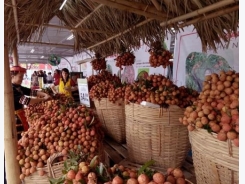Fruit, vegetable prices in Vietnam pressured from strong supplies

As consumers enjoy fresh, local fruit and vegetables this summer, farmers and producers can expect lower earnings from the fruits of their labour, say leading industry analysts.
As a result, economists at the Ministry of Agriculture and Rural Development are predicting a bleak outlook for farmers throughout the remainder of the growing season for many produce items, said Minister Nguyen Xuan Cuong.
It’s an open market balancing act to produce enough to meet demand, but not so much as to cause an oversupply that puts downward pressure on prices. And one that local farmers and producers have yet to master.
Mr Cuong noted the real benefit of the excess supplies is to the ultimate local and foreign consumer, who obtain lower prices for produce – such as peppers – at the grocery store.
The local segment needs to get a better grasp of how open market forces work and learn how to farm smarter, said Do Ha Nam, chair of the Vietnam Pepper Association. The more pepper that they grow and sell, the more pressure they put on sales prices to decline.
Domestic pepper prices have been falling steadily throughout the past two months, and consequently the VPA is urging local farmers to hold on to their inventories and wait for prices to recover— to the extent they can.
For those that can hold back, prices should turnaround over the next one to two months.
Mr Nam attributed the low pepper prices to a 15% jump in pepper output by local farmers in the early months of the year and import of an estimated 20,000 metric tons from Cambodia.
Over the long term, the forecast looks grim for pepper farmers as they continue to expand without first seeking additional outlets to sell the higher levels of product, which does little more than lower sales and earnings for the segment as a whole.
It simply isn’t smart farming as growers and producers need to stop, think through and layout a long-term strategy to achieve sustainability.
They need to map out plans to fund the construction of factories to process and can or convert the peppers into spice and sell in local and foreign retail markets, he underscored.
Most notably, they need to cultivate alternative export markets for fresh peppers.
Additionally, there is an untapped growing demand around the globe for specialized markets segmentation in the pepper industry, such as organic, that needs to be fully explored.
Lastly, farmers must stop growing low quality peppers with poor yields in unsuitable soil and alternatively find better crops more accommodating to the soil conditions that offer greater prospects for sales and earnings.
This is where the government should step in and develop guidelines to regulate and prevent cultivation in these lower grade soils.
If farmers and producers continue down the path they are on, concluded Mr Nam, there is very little prospect for the segment to sustainably benefit and they are essentially accomplishing little more than working for nothing in return.
Related news
Tools

Phối trộn thức ăn chăn nuôi

Pha dung dịch thủy canh

Định mức cho tôm ăn

Phối trộn phân bón NPK

Xác định tỷ lệ tôm sống

Chuyển đổi đơn vị phân bón

Xác định công suất sục khí

Chuyển đổi đơn vị tôm

Tính diện tích nhà kính

Tính thể tích ao




 Northern Vietnamese corn farmers find way to sustainable…
Northern Vietnamese corn farmers find way to sustainable…  Post-harvest technologies needed to increase farm produce competitiveness
Post-harvest technologies needed to increase farm produce competitiveness